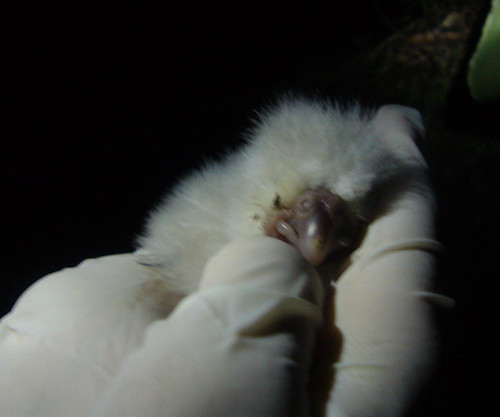 Kakapo population edging towards 100, may reach 120 in next few weeksKakapo population boosted by two, more chicks on the way
Kakapo population edging towards 100, may reach 120 in next few weeksKakapo population boosted by two, more chicks on the way
February 2009. The Kakapo Recovery effort is one step closer to bringing the world's kakapo population to 100 after the successful hatching of two kakapo chicks. The latest additions bring the small but increasing population to 93, and lots more chicks are expected in the coming weeks.
Potential 35 more chicks on the way
As well as the 25 confirmed fertile eggs yet to hatch, there are another eight to be checked and seven more females are ready to nest. Volunteers and Kakapo Recovery staff are keeping a close eye on the two chicks and monitoring their progress.
These chicks, from the same nest, could very well be the descendants of Richard Henry, the only surviving kakapo from Fiordland. His genes are valuable to providing genetic diversity to the kakapo population.
"It is such an exciting time for Kakapo Recovery with so many breeding aged females having mated and with more matings happening, things are going to get even busier on the island," Kakapo Recovery team leader Deidre Vercoe said.
Out of the 38 breeding aged females, 27 have mated and expectations are that this season will end with 80 percent having mated.
Major boost to kakapo survival
"It will be awesome to bring the kakapo population to more than 100 and all signs are indicating that could very well happen. If this breeding season produces 30 to 40 chicks it will be a huge step in the recovery of this species," she said.
Ms Vercoe said it was a breeding season like this which the Kakapo Recovery programme had been building up to. Kakapo only breed every few years when the rimu fruit is right, so this breeding season is even more incredible given six chicks were produced in 2008.
Dependent on rimu fruit
"The rimu fruit is the unknown for us," Ms Vercoe said. "If it doesn't ripen there won't be enough fruit for the mothers to feed their young and we will have to look at bringing the chicks to the mainland and hand-rearing."
Ms Vercoe said at this stage it could go either way. "Ideally we would like the chicks to remain on the island."
For regular updates on the breeding season visit the Kakapo Recovery website http://www.kakaporecovery.org.nz/
Kakapo breeding 2009
-
The first kakapo chick to hatch was initially expected to happen in early February with Lisa mating on Christmas Day. However, only one of her three eggs was fertile and just days before it was due to hatch the egg failed. It is unknown if the failure was due disturbance following a fight Lisa had with a petrel after it entered the nest. The good news is, it looks like Lisa has mated again and she may establish another nest in the next week or so.
- The success of artificial insemination won't be known until the parentage can be determined. This is done when the chicks are a bit older and through a blood sample. As females mate more than once, the chicks could be the product or prior mating or the result of artificial insemination. Time will tell.
- Several of the 2002 female chicks have bred again this year which is fantastic news as it was previously thought the minimum breeding age of a female kakapo was nine years. Two of the 2002 females bred for the first time at six-year-olds last year.